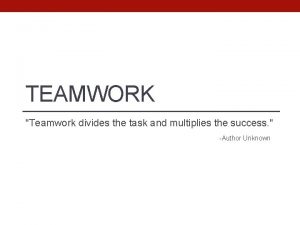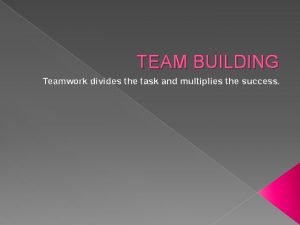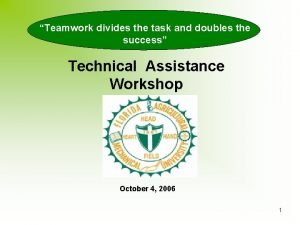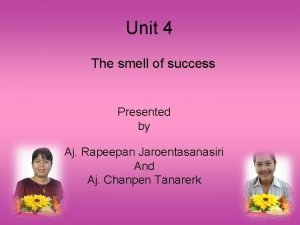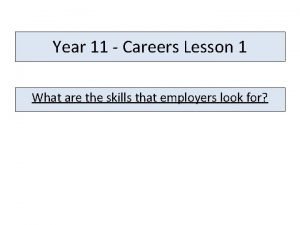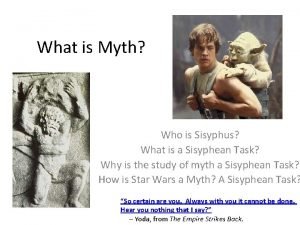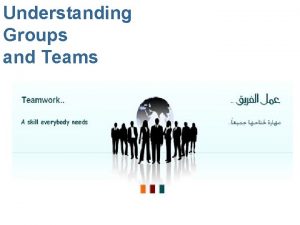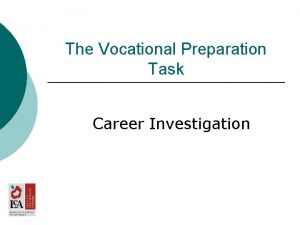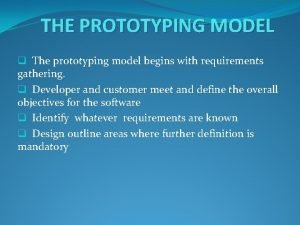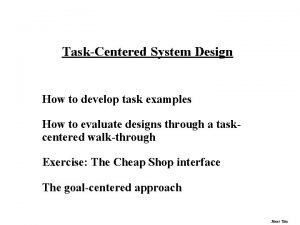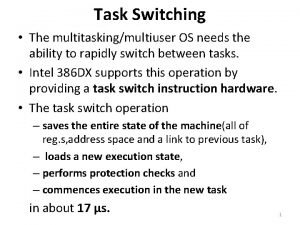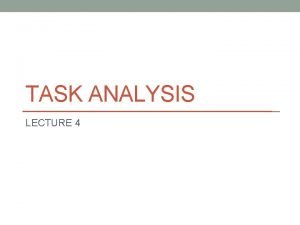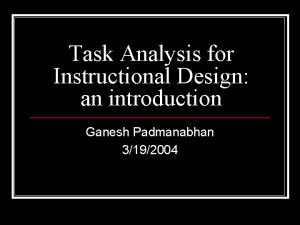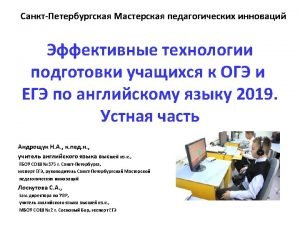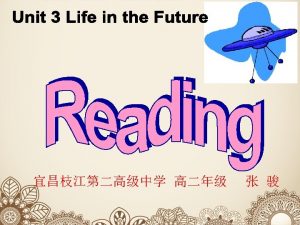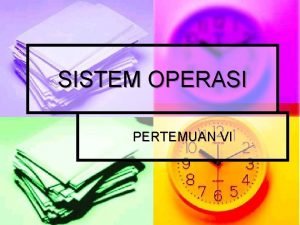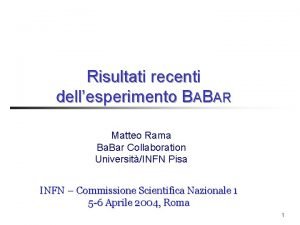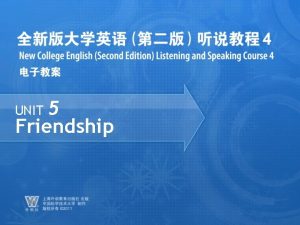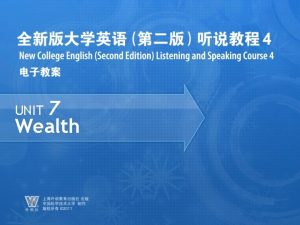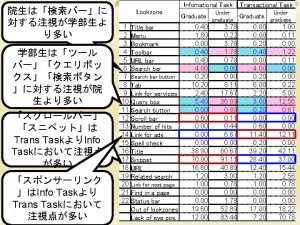6 Success UNIT Unit 6 Success Prelistening Task



































































- Slides: 67

6 Success UNIT

Unit 6 Success Pre-listening Task Language Focus Questions for Discussion 1. What is success? Name some successful people. Why do you consider them successful? 2. Success is often equated with prosperity and prestige. Do you think money and fame are the true measure of success in life? 3. What characteristics do you think successful people have that make them succeed?

Unit 6 Success Pre-listening Task Language Focus 4. Success often comes from doing things differently. Do you agree? 5. Have you ever wanted to start your own business? What do you think is the key to the success of a business? 6. Do you think you will ever become successful by being a trashman (someone who collects and hauls away trash)? Why or why not?

Unit 6 Success Pre-listening Task Language Focus

Unit 6 Success Pre-listening Task Language Focus

Unit 6 Success Pre-listening Task Language Focus Here are some sentences and structures that you might find useful in discussing the above questions. • Success means to be able to achieve something great / some kind of distinction in life. • Successful people are those who excel / give brilliant performance in the field they choose to pursue. • Success is a relative term. It can mean different things to different people. • If you achieve what you want / the goals you set in life, you are successful.

Unit 6 Success Pre-listening Task Language Focus • Success means more than money and fame. • Money and fame are only one standard for /measure of success. • We can be successful in different ways. • I don’t think true success lies in the size of one’s paycheck / the thickness of one’s wallet. • Success should be measured not by how much we own but by how much we are able to give to others.

Unit 6 Success Pre-listening Task Language Focus • I think success should be measured by / in terms of the contributions one makes to the society / to one’s fellow human beings. • Successful people, regardless of their professions, have their perspective and work steadily towards their goals. • Successful people work hard / know what they want / never give up when they face challenges or difficulties / learn from their failures / are alert to opportunities / are willing to take risks or chances.

Unit 6 Success Pre-listening Task Language Focus • Innovation and creativity are the key/secret to success. • Success in any realm of life comes/arises from the ability to think ahead / break the established rules and find innovative solutions to problems / find new and better ways of doing things. • We end up being mediocre if we keep doing things the same way / conform to conventional practices and conventional ways of thinking.

Unit 6 Success Pre-listening Task Language Focus • I’d like to start my own business when I have had some experience in … • Owning a business comes with / involves / entails a lot of risks and responsibility, but as the saying goes, no venture, no success. • I’m not the entrepreneur type / very businessinclined. I’ll end up losing money if I ever have my own company.

Unit 6 Success Pre-listening Task Language Focus • I think finding the right kind of product or service to offer customers/recruiting intelligent and loyal employees / good marketing / good advertising plays a vital role in the success of a business. • Any line of business (collecting trash or disposable items from people’s homes, for example) may make you successful as long as you develop an innovative way to run it.

Unit 6 Success Listening Tasks Speaking Tasks Word Bank Language and Cultural Notes Exercise 1 hunk prestigious internship flyer Exercise 2 n. (infml) a handsome man with a fine physique体魄健美的男子 a. inspiring respect and admiration; having a high reputation 享有声望的 n. the position of an intern 实习的 职位 n. a piece of printed information about a product or event 小广 告传单

Unit 6 Success Listening Tasks Speaking Tasks Word Bank Language and Cultural Notes Exercise 1 turndown gamble logo recruit Exercise 2 n. rejection or refusal 拒绝 v. to take a risk in the hope of making money or achieving success 赌博;冒险 n. a symbol of a company name, trademark, often uniquely designed for ready recognition 标识;商标 v. to hire new members or employees 招收,招聘

Unit 6 Success Listening Tasks Speaking Tasks Word Bank Language and Cultural Notes Exercise 1 franchise credit rating Exercise 2 n. a business given the right to sell a company’s products or services in a particular area using the company’s name 加盟连锁店 an estimate of the ability of a (potential) customer to fulfill their financial commitments, based on their financial resources and previous payment pattern, etc. 信用等级

Unit 6 Success Listening Tasks Speaking Tasks Word Bank Language and Cultural Notes Exercise 1 Exercise 2 graphic artist a graphic designer平面造型 设计师 pull in to earn (money) 获得(利益、 报酬等) Omar Soliman Nick Friedman 人名 人名 University of Miami 迈阿密大学

Unit 6 Success Listening Tasks Speaking Tasks Word Bank Language and Cultural Notes Exercise 1 Exercise 2 1. Background information College Hunks Hauling Junk is the largest junk removal franchise based in the United States. Founded in 2005 by two young college graduates, Nick Friedman and Omar Soliman, the company hires college students to remove unwanted items for homeowners and businesses across the country. Despite the company’s name, looks are not part of the job requirement, but all employees, mostly male (and a few female) college students, are required to

Unit 6 Success Listening Tasks Speaking Tasks Word Bank Language and Cultural Notes Exercise 1 Exercise 2 be friendly and clean-cut. These college haulers and the company’s catchy slogan “Let tomorrow’s leaders haul your junk today” put a new image to an otherwise unglamorous business. Since its foundation, the company has experienced rapid growth and success. Its revenue hit $3 million in 2008. Currently it has 16 franchises in 10 states and D. C. It also has a website, a toll-free number and a call center in Maryland that can take orders from around the country. The listening passage tells us

Unit 6 Success Listening Tasks Speaking Tasks Word Bank Language and Cultural Notes Exercise 1 Exercise 2 how the two founders of College Hunks Hauling Junk have turned a summer part-time job into a multimillion dollar enterprise. 2. Omar Soliman’s mother joined the chorus. Omar Soliman’s mother joined the universal cry of parents to urge their children to take a job during the summer break.

Unit 6 Success Listening Tasks Speaking Tasks Word Bank Language and Cultural Notes Exercise 1 Exercise 2 3. But he couldn’t imagine himself sitting at a desk all day. But he didn’t like working in an office. 4. … they didn’t have much of a credit rating. … they didn’t have a history of reliable credit dealings as they had just started running a business. 5. … gamble $50, 000 on their idea. … take the risk of lending them $50, 000 to see if

Unit 6 Success Listening Tasks Speaking Tasks Word Bank Language and Cultural Notes Exercise 1 Exercise 2 their idea would work. 6. To cut down the cost of unloading at landfill … Landfills charge their customers a disposal fee based on the weight or volume of the waste they drop off at the site. Garbage collectors, therefore, are motivated to seek alternative disposal methods such as recycling or reuse to reduce the amount of waste they dump at landfills.

Unit 6 Success Listening Tasks Speaking Tasks Word Bank Language and Cultural Notes Exercise 1 Exercise 2 Listen to the passage and choose the right answers to the questions you hear. 1. a. Like most parents, she wanted her son to get a job for the summer break. b. She was opposed to her son’s idea of starting a junk-collecting business. c. She wanted her son to help her deliver furniture during the summer break. d. She came up with the name for her son’s new business.

Unit 6 Success Listening Tasks Speaking Tasks Word Bank Language and Cultural Notes Exercise 1 Exercise 2 2. a. To deliver furniture for his mother’s store. b. To work as an intern at a research firm. c. To distribute flyers for businesses. d. To help people get rid of things they no longer want in their homes.

Unit 6 Success Listening Tasks Speaking Tasks Word Bank Language and Cultural Notes Exercise 1 3. a. $220. b. $1, 000. c. $2, 200. d. $10, 000. Exercise 2

Unit 6 Success Listening Tasks Speaking Tasks Word Bank Language and Cultural Notes Exercise 1 Exercise 2 4. a. They had trouble finding a bank willing to lend them money. b. They felt they were meant to get a good job. c. They wanted to get some work experience before starting their own business. d. They were not able to get the support of their parents.

Unit 6 Success Listening Tasks Speaking Tasks Word Bank Language and Cultural Notes Exercise 1 Exercise 2 5. a. They work only on weekends. b. They donate a portion of their income to charities. c. They wear a uniform. d. They are from low-income families.

Unit 6 Success Listening Tasks Speaking Tasks Word Bank Language and Cultural Notes Exercise 1 Exercise 2 6. a. It is the most profitable company of its kind in America. b. It only recruits attractive college students as employees. c. It has franchises in almost every state in America. d. It is an environmentally friendly and socially responsible company.

Unit 6 Success Listening Tasks Speaking Tasks Word Bank Language and Cultural Notes Exercise 1 Exercise 2 Listen to the passage again and complete the table below. College Hunks Hauling Junk Founders Reason for starting the business Starting money Soliman, a business major, and Friedman, an economics major Soliman had years of experience in delivering furniture for his mother’s store and he realized that a lot of people had stuff they wanted to get rid of. $110, 000

Unit 6 Success Listening Tasks Speaking Tasks Word Bank Language and Cultural Notes Exercise 1 Exercise 2 College Hunks Hauling Junk Items of junk they haul away everything from construction materials to old couches Measures to reduce the They recycle metals and electronics and cost of unloading at donate over 60 percent of what they collect landfills to charities. Earnings in 2008 $ 3 million Number of employees 130 Number of franchises 16, expected to expand to 80 by 2012

Unit 6 Success Listening Tasks Speaking Tasks Word Bank Language and Cultural Notes Exercise 1 Exercise 2

Unit 6 Success Listening Tasks Speaking Tasks Pair Work A. Reflections on the text You’ve just heard a story about how two young men turned a summer job into a successful business. We don’t normally associate success with collecting junk. What do you think makes Nick and Soliman’s business so successful? Do you find their success inspirational? In what ways do they inspire you? What have you learned about success and entrepreneurship from their story? Exchange views with your partner. You may mention the following points in your discussion.

Unit 6 Success Listening Tasks • • • Speaking Tasks junk removal - a service in demand “hunky” college haulers: a big selling point professionalism entrepreneurial spirit (creativity, risk-taking) generosity and concern for the larger good

Unit 6 Success Listening Tasks Speaking Tasks B. Debating - Arguments for or against the view that hard work is more important than talent in achieving success A Sample Many people are of the view that the key to success is hard work and that luck plays a very small role when it comes to success. Are you for or against the view that hard work is more important for success than luck? Express and defend your

Unit 6 Success Listening Tasks Speaking Tasks views from the perspectives given in the card below. Topic: Is hard work more important for success than luck? Perspectives: 1. From the perspective of a student (positive) 2. From the perspective of another student (negative)

Unit 6 Success Listening Tasks Speaking Tasks Now use the above sample as your model and carry on similar activities with your partner. Topic: Is hard work more important for success than talent? Perspectives: 1. From the perspective of a student (positive) 2. From the perspective of another student (negative)

Unit 6 Success Listening Tasks Speaking Tasks Below are some ideas and expressions that you might find useful in presenting your argument. From the perspective of a student (positive) -Genius is one percent inspiration and ninety-nine percent perspiration. (Thomas Edison) -excellence in any field -- only achieved through hard work -achievements –coming from years of practice, from curiosity and painstaking efforts -child prodigies, often fading into obscurity in later life

Unit 6 Success Listening Tasks Speaking Tasks -Talent is a plus, but hard work is an absolute must for success. From the perspective of another student (negative) -successful people - have a talent for what they do -successful people - not the only ones who work hard (Both Mozart and Picasso worked hard at their craft, but it’s naïve to think that if we practice hard enough, we can become better composers than Mozart or better artists than Picasso. )

Unit 6 Success Listening Tasks Speaking Tasks -talent, a must for being really good at something, for making it to the top; the belief that we can achieve anything with hard work - misleading. -Not all child prodigies fade into obscurity as adults. Many remain high-achievers in their adult life. (e. g. Mozart, Picasso, Tiger Woods, to name a few. ) -Talent is a very big plus. Without talent the ninetynine percent of hard work would hardly amount to anything.

Unit 6 Success Listening Tasks Speaking Tasks

Unit 6 Success Listening Tasks Speaking Tasks

Unit 6 Success Test Your Listening A Passage Listen to the passage and choose the right answers to the questions you hear.

Unit 6 Success Test Your Listening 1. a. She’s American. b. She’s British. c. She was a failure before her journey around the world. d. She enjoyed traveling around the world most.

Unit 6 Success Test Your Listening 2. a. In Africa. b. In England. c. In America. d. In Europe.

Unit 6 Success Test Your Listening 3. a. He volunteered to work in Tanzania. b. His marriage with the speaker was based on true love. c. He thought marriage should be based on mutual love rather than material wealth. d. He wanted to travel around the world with the speaker.

Unit 6 Success Test Your Listening 4. a. The speaker considered her marriage with Eric a great success in her life. b. The speaker dreamed of marrying a man like Eric when she was young. c. Eric would probably ask the speaker to settle down in America. d. Eric and the speaker fell in love at first sight.

Unit 6 Success Test Your Listening

Unit 6 Success Movie Time to Talk Word Bank Exercise A Exercise B

Unit 6 Success Movie Time to Talk Word Bank Exercise A Exercise B

Unit 6 Success Movie Time to Talk Word Bank Exercise A runner up merchandising ace Polka Dots a heck of Law School Admission Test Exercise B 亚军 n. 销售 v. 获得优秀 波尔卡圆点,时尚设 计业中一种圆点图案 (用于加强语气)相 当厉害的一个 美国的法学院入学考 试

Unit 6 Success Movie Time to Talk Word Bank Exercise A tighty-whitey Lambda Kappa Pi CULA extracurricular faux sorority philanthropist Exercise B (俚语)内裤 美国大学里的一 个学生团体,成 员多为优秀学生 City University Los Angeles adj. 课外的 a. 人造的 n. 妇女联谊会 n. 慈善家

Unit 6 Success Movie Time to Talk Word Bank Exercise A Exercise B Choose the best answer to each of the following questions. 1. How did the girl’s parents respond when hearing her decision to go to Harvard? A. Her parents thought she was not capable enough. B. Her parents were very supportive. C. Her parents thought it was unsuitable for her. D. Her parents were worried about her grades.

Unit 6 Success Movie Time to Talk Word Bank Exercise A Exercise B 2. What was the girl specialized in? A. She was specialized in fashion. B. She was specialized in law. C. She was specialized in math. D. She was specialized in music.

Unit 6 Success Movie Time to Talk Word Bank Exercise A Exercise B In this movie clip, the girl finally succeeded in entering Harvard Law School in spite of the doubts from others. Obviously no one can succeed by chance. Look at the following picture of eight factors leading to success, which are concluded by Richard Johns. Do you agree with him? Or do you want to add other factors, like friendship or family background? Give your choices of factors that you think are the most important and explain each with examples.

Unit 6 Success Movie Time to Talk Word Bank Exercise A Exercise B

Unit 6 Success Movie Time to Talk Word Bank Exercise A Exercise B Here are some useful expressions for your reference. A number of factors might contribute to the success. The answer to his success involves many factors. More than one reasons account for the success. The success mainly stems from the fact that. . . The success largely results from. . . We may blame the failure, but the real causes are. . . Part of the explanations for the success is that. . .

Unit 6 Success Movie Time to Talk Word Bank Exercise A Exercise B That may give rise to the success. The immediate result it produces is that. . . It will exercise a profound influence upon the life.

Unit 6 Success Movie Time to Talk Word Bank Exercise A Exercise B

Unit 6 Success Movie Time to Talk Look at these pictures and describe them one by one. If possible, try also to find something relevant to talk about.

Unit 6 Success Movie Time to Talk

Unit 6 Success Movie Time to Talk

Unit 6 Success Movie Time to Talk

Unit 6 Success Movie Time to Talk 1. Albert Einstein, was born in Germany in 1879, frizzy-haired physicist, his most important research in Princeton, New Jersey, best known for his Theory of Relativity, and his equation E=mc 2, Einstein’s work, revolutionized the field of theoretical physics, made him a celebrity throughout the globe, thought of himself as “merely curious”, in his youth, his curiosity led him to explore the field of natural science

Unit 6 Success Movie Time to Talk 2. Chen-Ning Yang (杨振宁), a Chinese. American physicist, statistical mechanics and particle physics, was born in Hefei, Anhui, China, in 1946, Yang went to the US and studied at The University of Chicago, he received his doctorate in 1948, together with Tsungdao Lee, he received the 1957 Nobel Prize in physics, for their work on parity non-conservation of weak interaction, he naturalized as a United States citizen in 1964, after retiring from Stony Brook, he returned as honorary director of Tsinghua University in Beijing, remained very active, in his academic research, gave hundreds of lectures in China

Unit 6 Success Movie Time to Talk 3. a book cover, entitled “The 12 Factors of Business Success”, not quite sure what it says, the subtitle of the book – “Discover, Develop, and Leverage Your Strengths”, the authors of the book, Kevin Hogan, Dave Lakhani and Mollie Marti, try to teach people to become successful in business, try to use their own experiences in business to give tips, hopefully, after reading it, the readers can discover and develop their ability and strengths

Unit 6 Success Movie Time to Talk

Unit 6 Success Movie Time to Talk

Unit 6 Success Movie Time to Talk

Unit 6 Success
 Tiered task bias task
Tiered task bias task Teamwork divides the task and multiplies the success
Teamwork divides the task and multiplies the success Teamwork divides the task and multiplies the success
Teamwork divides the task and multiplies the success Teamwork divides the task and doubles the success
Teamwork divides the task and doubles the success Your child's success or lack of success
Your child's success or lack of success Your child's success or lack of success
Your child's success or lack of success Unit 14 health and social care level 3
Unit 14 health and social care level 3 Zheng he
Zheng he Simple letter for parents
Simple letter for parents What is a contractual brief
What is a contractual brief Unit 2 task 2
Unit 2 task 2 Unit 11 task 1
Unit 11 task 1 Which of these headlines most involves a due process right?
Which of these headlines most involves a due process right? Unit 4 success
Unit 4 success Unit 10, unit 10 review tests, unit 10 general test
Unit 10, unit 10 review tests, unit 10 general test You have 30 minutes to do this task
You have 30 minutes to do this task You have 30 minutes to do this task
You have 30 minutes to do this task Learning task 2 im an architect
Learning task 2 im an architect Learning task 1 look around inside your house
Learning task 1 look around inside your house Learning task 7 draw a simple map
Learning task 7 draw a simple map Situation, task, action, result examples
Situation, task, action, result examples Shorttask
Shorttask Sisyphus define
Sisyphus define Stacq
Stacq Verilog for문
Verilog for문 Esempio di task analysis
Esempio di task analysis Task analysis adalah
Task analysis adalah Exploring online planning and task management
Exploring online planning and task management Performing task meaning
Performing task meaning Example of informal group
Example of informal group Task analysis toileting
Task analysis toileting Ting task
Ting task Lca career investigation task
Lca career investigation task Task predicts performance
Task predicts performance Software engineering task
Software engineering task Prototyping model
Prototyping model Sentence completion activity
Sentence completion activity The james lange theory of emotion states that
The james lange theory of emotion states that Task design example
Task design example Task centered approach example
Task centered approach example Task state segment contains
Task state segment contains Tasks conditions and standards
Tasks conditions and standards Task briefing sheet
Task briefing sheet Monitor task cards
Monitor task cards Concur task tree
Concur task tree Hierarchical task analysis
Hierarchical task analysis Task analysis instructional design
Task analysis instructional design Task 2 study the advertisement
Task 2 study the advertisement Task 1 read the text
Task 1 read the text Task 1 read the text
Task 1 read the text Skin task
Skin task Task 1 look at the pictures and answer the questions
Task 1 look at the pictures and answer the questions Esempio di task analysis
Esempio di task analysis Making connections task cards
Making connections task cards Kompetensi inti bidan
Kompetensi inti bidan Pengertian task dalam sistem operasi
Pengertian task dalam sistem operasi Short writing
Short writing Nbee
Nbee Ui++ sccm task sequence
Ui++ sccm task sequence Bmat mobility
Bmat mobility Task force leader responsibilities
Task force leader responsibilities Holistic rubric
Holistic rubric Culminating writing task romeo and juliet
Culminating writing task romeo and juliet Babar task bar
Babar task bar Real world tasks
Real world tasks Task environment properties
Task environment properties Product oriented performance based assessment
Product oriented performance based assessment Task region in spiral model
Task region in spiral model

